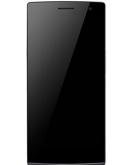Do you want to know more about the Oppo Find 7a X9007 TD-LTE? We have already selected all the specifications for you and listed below.
The Oppo Find 7a X9007 TD-LTE was launched in April 2014. The smartphone comes with a 5,5 inch screen with a resolution of 1080 x 1920 pixels.
Processor
This Oppo is powered by a Qualcomm Snapdragon 800 MSM8974AB v2 chip with a 2,265 GHz Quad-Core processor. This chipset has a quad-core processor with 2048 MB RAM. With a thickness of 9.2 millimeters, the device is not too thick. This phone weighs 165 grams.
Camera
The Find 7a X9007 TD-LTE has a 16 megapixel camera, it means that the camera is capable of capturing detailed images without the added cost and complexity of a higher megapixel count. This can be useful if you want to take high-resolution photos that you can zoom in on or crop without losing too much detail, but you don't need the very highest level of image quality. In general, having this amount of megapixels can provide a good balance of image quality and affordability. You can also use the 1,9 megapixel selfie camera for video calling, for example.
Pros
- 16 megapixel camera
- Quad core processor
- Not too thick with 9.2 millimeters
- HSDPA, LTE support for super fast internet
Negatives
- If you import this device it may take longer before it is delivered
- With a 2700 mAh battery you may have to recharge in between
Call & data functions
The Oppo Find 7a X9007 TD-LTE supports frequencies from international networks with which you can use the fast LTE network. The speed of LTE is perfect for intensive use of internet on the road where the speed does not differ much from home. Please note that it is very fast and you do not take out a small data plan, because the data is used up before you realize it. You can also connect via WiFi at home or at the office.
Memory and connection options
The Oppo Find 7a X9007 TD-LTE has 2048 MB of RAM (2 GB) and 32 GB internal storage . Expandable memory: microSD up to 32GB. There is a USB connection, you can use this to exchange data with your laptop or to charge your device. Connecting Bluetooth headsets or car kits is no problem.
Do you take a lot of photos and videos? Then the storage of 32 GB is less suitable. You may need to clean your phone after a while. Furthermore, there are of course possibilities to expand storage in the cloud, such as with Google Drive or Dropbox.
Screen & operation
The phone is operated via the large 5,5 inch touchscreen.The Oppo Find 7a X9007 TD-LTE can display up to a 16 millions colors. This screen has a resolution of 1080 x 1920 pixels. It is claimed that the human eye can distinguish a maximum of 477 pixels per inch at 30 cm. With 400 pixels per inch, this HD screen is super sharp and true to life, even at close range. This does not get your eyes tired and you can easily enjoy the highest resolution images.
Operating system
Android 4.3 Jelly Bean, announced at the end of August 2013 is an older version of the popular Android OS. It is based on the previous version, but then further developed. Especially the possibility to set up multiple users at user level is a major update. In addition, there is support for Bluetooth smart technology to provide a better connection with fitness devices and Open GL ES 3.0 (graphical improvements). There are also more DRM APIs added that make it possible to stream content in higher resolution from including Netflix. Android versions lower than 8 are older versions of the Android operating system. Some of the key features and capabilities of these older versions may include:
- Support for older hardware and device configurations
- A less intuitive and user-friendly interface compared to newer versions
- Limited support for newer apps and services that may require the latest version of Android
- Inability to receive security updates and bug fixes from Google, which can leave the device vulnerable to security threats and exploits
- Overall, Android versions lower than 8 may not offer the same level of performance, stability, and security as newer versions of the operating system. If you are using an older Android device with a version lower than 8, it is a good idea to consider upgrading to a newer version if possible, in order to take advantage of the latest features and improvements.


 The Oppo Find 7a X9007 TD-LTE received 5 out of 5 based on 1 review.
The Oppo Find 7a X9007 TD-LTE received 5 out of 5 based on 1 review.